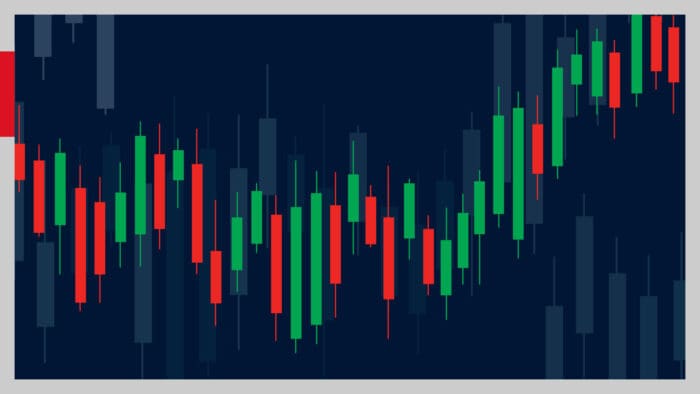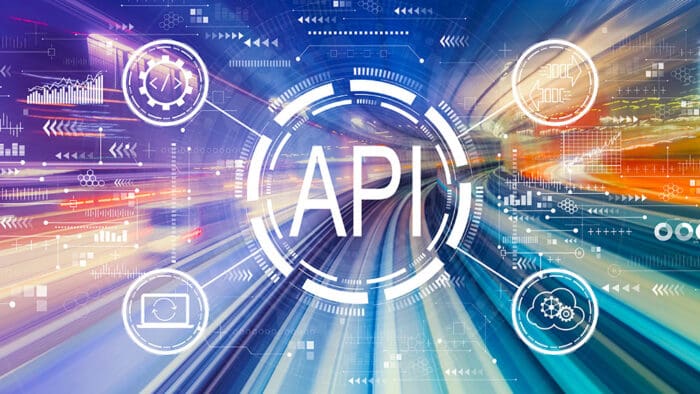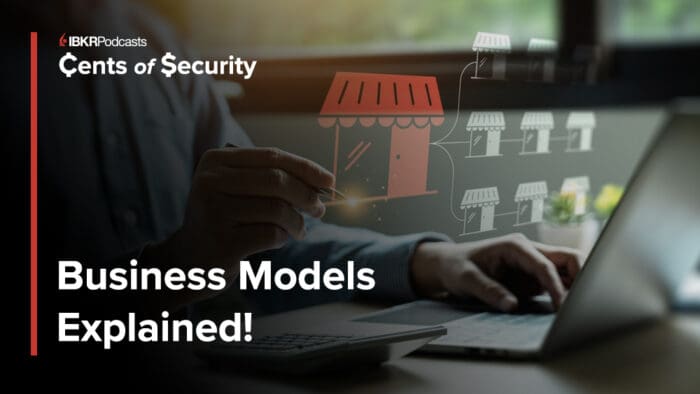A business model is one of the most important aspects to understand when creating or researching a company. However, one may ask what type of business models exist and is one better than the others? Jose Torres, Interactive Brokers’ Senior Economist joins Cassidy Clement, Senior Manager of SEO and Content to discuss.
Summary – Cents of Security Podcasts Ep. 67
The following is a summary of a live audio recording and may contain errors in spelling or grammar. Although IBKR has edited for clarity no material changes have been made.
Cassidy Clement:
Welcome back to the Cents of Security Podcast. I’m Cassidy Clement, Senior Manager of SEO and Content here at Interactive Brokers. And today I’m your host for the podcast. Our guest is Jose Torres, IBKR Senior Economist.
A business model is one of the most important aspects that you need to understand when creating a business or when researching a business. However, There’s more than one. Business model type. And many may ask, is one better than another? How many models are out there? How many businesses fall into each type of model? We’re going to discuss all that and more in today’s episode. Welcome back, Jose.
Jose Torres:
Hi Cassidy, great to be here. Hello everyone.
Cassidy Clement:
So really the idea of this is coming out of, People investing in different types of businesses, but them not understanding the core business model of how they make money, how their company could grow or how their company may not be able to grow because of the way that their model is structured. Sometimes that may mean if you have a subscription model that certain types of flow of revenue can be on a timeline, if you will, where others can be something of a freemium type of business model, where some people come in free and then move up to a premium paid version. There’s many things out there. So let’s just get down to the basics here at first, which is what exactly is a business model at its core and how crucial is it when you’re setting up a new business to keep that in mind or if you’re researching a new business you’re not familiar with?
Jose Torres:
Well, it’s crucial, right? You need to understand where your capital is going to come from to launch the business. You also need to see where your revenue capabilities are, as well as your expenses. There’s many different kinds of businesses. There’s businesses that in the beginning, they’re focusing on cash flow generation from day one, while others are looking to get started and start building customers and are not necessarily concerned about profit in the short term. They’re looking more to build a customer base and then looking for earnings growth, maybe in the medium or longer term. I think a pivotal aspect is what are your advantages, right? When you’re going into business, whether you’re an individual or you’re a group of people, what your advantages are key. Cause when you go out into the business environment, you have to be able to compete for customers for pricing for vendors, and you got to have a good proposition.
Cassidy Clement:
Yeah, absolutely. I mean, really, when it comes to the business that you are looking to invest in, whether it’s looking at a stock or a business. Actually seeing like, hey, this business looks like it’s going places, I’d like to, you know, be on the ground floor, et cetera. You know, you have to look and you owe it to yourself as an investor to see what exactly is that company selling? Is it a product, is it a service? How’s it intending to enter the market? Are there certain types of expenses that are specific to that business that they’re in and of course how they’re going to turn a profit.
Now a lot of that goes into the different models or the landscape that are really common in their market area. So if we’re talking about something that’s, you know, eCommerce, obviously they’re selling products. If they’re talking about like a cleaning service, that’s a service. So it may be something simple in the basic versions, but then it can obviously get very much more complex. So when we’re looking at the business landscape in general, what types of models would you normally see out there that people may be familiar with, but they didn’t know, that they actually come with a label?
Jose Torres:
Sure. So one of them is products, right? You’re going to build a product that is going to be a superior quality and competitive price relative to what’s out there. And then one of the considerations there, you have to start competing for shelf space at large retailers, really all retailers, but at the large retailers, that’s where conditions are really competitive, of course, because they have a lot of stores all around the world. They have a lot of customers going in and out. So if you want to have shelf space in Walmart or in Target or in Best Buy or Nordstrom or something like that, your product has to bring a good proposition. So we’re talking about competitively priced and higher quality. Or of course the perception of superior quality and a good price because a lot of times you know, I’m sure many of you in the audience have examples where products have been overpriced right? Or maybe the quality wasn’t as good as folks thought in the beginning. So the perception and the actualities of course are different and then with products there’s also quality control. Many companies once they reach a specific number of sales and they want to start boosting income, they start maybe reducing quality a little bit cause they feel like they already have the customers, right? So that’s also a consideration.
Then there are services like Cassidy said earlier, you have cleaning services, you have haircuts, nails, you have all the online services that we consume. We have Netflix to watch the movies. We have the Spotify for the music. Apple Music, of course, competitors. Amazon for eCommerce, there’s also some services there, you know, in eCommerce, because the delivery aspect is actually a service, right? You’re getting a good delivered to you, but the delivery is a service. Then there’s the subscription model, right? Which depends on folks paying a monthly fee usually to Amazon or Spotify or Apple music or Costco or, right. And the idea there is that consers are going to keep paying for it over time, because they need it. And usually those firms are looking to build their customer base first. They’re not really worried about gains or losses that much in the beginning, in the early stages. They’re usually focused on building their footprint and scale. You also have shared assets, right?
That’s going to be like the gymnasi where folks kind of pay like a subscription fee to access that shared asset. You know, like a, like a gymnasi, or like a country club, or like a golf club, right? Folks pay to enjoy the amenities as well as the staff and the labor that’s working to keep the place clean, keep it high quality, make sure the golf clubs are there, make sure the towels are there for the steam room or the fitness center, stuff like that, right?
And then we have the lease rental kind of business model, where you have car rental companies and their whole thing is, you know, they’re going to buy cars and they’re going to sort of arbitrage that with the rental fee. And the idea is that the rental fees over time will totally offset what the cost of the car was alongside the cost of marketing, the cost of labor, the cost of maintenance, right? That’s the kind of model we have lease rental model. Also, car manufacturers do the leases on the vehicles when they have a brand new vehicle, they rent it to you, really a long term rental. We call it a lease and manufacturers will rent out a car over 3 years and have a customer pay monthly for the period of those 3 years and at the end, there’s also an option to buy, or a lot of folks, they always want to be in a new car every 3 years, they’ll just release the car. You also have the apartment rentals and home rentals. That’s a huge deal, especially now with shelter costs and housing affordability really weighing on American budgets.
So that’s been a huge thing. A lot of folks have been renting apartments, renting homes, as, you know, they either prolong home ownership or just see themselves as a longer term renter. Insurance is also a business model. You’re essentially shifting the risk of an event occurring to somebody else, right? Involuntary on both sides. So the person that is, selling the insurance is offering a particular price to then take on the risk from the buyer. We see that in financial markets all the time, right? When you’re selling puts, for example, selling a put option, you are essentially selling insurance that if the underlying goes below a particular price, now you have to own it at, you know, below a particular strike price.
You also have housing insurance, right? You pay the Insurance company, in case something happens to your house, then the insurance company has to pay out. The insurance company is hoping, of course, that all the premium or money that gets sent to the insurance company is going to exceed the expenses of the insurance company or the claims of the insurance company, right? So, if the insurance company brings in, let’s say, 200 million, they don’t want the cost of accidents for which the insurance company is liable for, they don’t want that cost to exceed the 200 million, right? And that’s where their profit margin lies.
Finally, there’s the agency promotion kind of business model and this is sort of your sales people that are really experienced and they feel that their advantage, remember with business models, folks, advantages are key, right? You want to play to your strengths, and not necessarily to your weaknesses because, you know, it’s tough out there and everyone wants to make money. So you have to be competitive and you have to be good if you want to get a piece of the pie. So with agency and promotion business model, right, you have realtors, you have stock brokers, you have car sales folks, you have, recruiters, promoters. These are people that are sort of like hype men, hype women, that can really go out there and create hype around your product, your service, your shared asset, your subscription, your rentals, your insurance.
And then finally, I forgot to mention reselling. That’s sort of like wholesaling, you know, you buy in bulk and then you essentially just resell. So you’re not actually, producing a product like the first example that I gave earlier, you’re not manufacturing anything, you’re buying things that are already manufactured, and you’re selling them at a premium. So what’s your advantage there? Your advantage there is either you have a lot of capital, so you can buy in huge quantities and achieve that better cost per unit. Or perhaps you have a transportation benefit where you can get things from point A to point B a lot faster. So that’s where your advantage lies, but that’s another business model is reselling. But the margins and reselling tend to be very, very slim, because it’s very, very competitive. Of course, everyone would want to buy things for a cheaper cost and sell them for more expensive.
Cassidy Clement:
Yeah. I mean, something to keep in mind for the listeners who are just starting out, let’s say, in business school or just starting out in a financial company and research or looking to start a business of their own. There are subsets of those main business models that you spoke about. There may be franchising. There may be elements of reselling in something that’s part of a service. There could be something like sports teams have hands in all of this. They sell gear, they have events, they have food involved, they have service involved. Like there are so many different pieces to business models, but at its core, it’s important to think about what the core business model is for that business, when you’re evaluating how you think they’re going to perform, or if it’s your own business, how you think you’re going to start to get a leg up within the competition. Because as you said, everybody wants to make money and it’s very hard to get the capital sometimes that you need or considering some of the products that people sell that are supposed to last, let’s say five years, something like a new computer or a new piece of hardware for a computer.
If you don’t look like a business that can maybe stay around because your business model doesn’t look very profitable, it may not be an alluring product because the user or the potential buyer might say, well, I don’t know if you’re going to be around in five years to be able to help me if the product breaks, or will my warranty still be good? Things of that nature. So when we’re starting to look at this in a broken down way that looks kind of like we’re putting things in buckets, we all know it’s more complex than that, but is there one model that tends to be better than another or is it mainly sector centric?
Jose Torres:
Well, that’s a tough one, but what I will say is that the business community, generally speaking, has been moving towards services that don’t have high fixed costs, right? We sort of moved away from the manufacturing heavy kind of economy that we had back in the 1970s, 60s, 50s, right? And we’ve been moving more towards services. So that implies less physical work, whether it’s manual han labor, as well as machine factory kind of stuff that’s sort of been dwindling. The more advanced countries in the world have been embracing more services and more kind of subscription models whereas, the more emerging kind of economies have been taking more of the manufacturing burden. The reason is, Cassidy and folks, is that those countries have a lower cost of labor and once airplanes and ships and trade routes became more sophisticated, it became a lot easier to start outsourcing stuff.
However, against that backdrop, post pandemic, we’re still very early, but there has been an effort on both sides of the political aisle that have been trying to get more on shoring, more manufacturing in the states, but because of reasons we spoke about earlier, it’s tough to compete with those lower cost nations. And it’s tough to manufacture stuff here without having an inflationary impact. It was very, very expensive. So, in terms of what’s better or what’s worse, it really depends on your advantages. But, economically speaking, I am the economist. The more advanced economies, the wealthier nations, they’ve been shifting more into services and subscriptions rather than physical assets.
Cassidy Clement:
We’ll say those who are in college or in high school who has studied a little bit more of the up and coming type of businesses, you know, tech is always, at least for the past couple of decades, has always been the main spotlight, you know, that people have been covering that. But as of late, you know, you start to see things like NVIDIA and Intel and these other places that, yes, they’re technology, but they do, they do derive some value out of that manufacturing. And that’s where you have to start to look at the business model area. Because in the beginning of 2020, because of the pandemic people weren’t always looking towards physical semiconductors and things being made like that. And then when that shock came into the picture, when we started to go into a different type of economic state with the pandemic, those manufactured goods started to become very, very valuable because there weren’t many others being made. And you know, if our country was mainly more of a service country, it was even harder to get some of that. So it’s important to think about this in different ways, and in different ways that it applies to your investment research or your company. So when we’re looking at reviewing companies, business models, whether it’s for investment research, a school project, or even starting your own business. What are some questions that listeners should ask themselves?
I mean, I know the most basic one I was taught in business school was what problem does this solve? I think that’s the easiest one, but when we start to get into the business model aspect, what questions would you say to think about?
Jose Torres:
So one crucial aspect is the management, right? Who’s running the firm? You know, what’s their history? Do they have a lot of years of experience? Are they resilient? How have they managed downturns, right? When business isn’t so good, has this management team been able to still grow earnings, maintain revenues, drive some kind of financial performance? Or is it the kind of business where when things are great the business is doing excellent, but then when economic conditions begin to deteriorate, the business becomes, a big problem, a money loser, and it doesn’t perform at all, right? So the volatility of earnings, I guess that’s the next topic. What’s the volatility like, right? What’s going to happen if other competitors come in? What’s going to happen if the economy starts to perform worse, right? What kind of competitive position does the company have? Right? What kind of moat do they have? Are they easily replaceable or do they have a position that’s very strong and with a high barrier to entry? Right? What’s their balance sheet like? Right? Can they absorb some losses in case there are some problems, right? Can they go into M&A if their primary business runs out of growth drivers, right? Those are, I would say, some of the considerations, that are important. Interest rates also, what kind of interest rate risk? If rates increase significantly, how is this business going to perform? What if they drop significantly? If the business is a lender and rates drop significantly, then maybe that’s negative. But, if the investor, you know, is a borrower, primarily, and rates fall out, then that’s good, right? So all those, considerations I would say are important, among others.
Cassidy Clement:
Yeah. And I mean, realistically, it’s going to be the, specific to the specific item that you’re looking at. Of course, nobody wants to hear the, well, it depends type of answer, but it is the truth. I mean, the market needs change, and as you mentioned, depending on the market that you’re trying to sell to or offer your service to, like an American market, it may be in a way of more of a service vibe than a product vibe or something like that where you may set out with an idea but the market might not be there or vice versa. So usually it’s on the it’s on the researcher to understand if that valuation reflects the market over time or if it’s more of a snapshot or a trend that’s happening. But there’s all types of data points out there to take in. I think from my perspective, it was important to explain to our listeners, the different business models that go into the makeup of the market because on our other channel, IBKR Podcast, it’s more of a commentary area on what’s happening right now in the markets. And it’s very easy to go out and say, okay, well Uber is doing really good or Nvidia is doing really good but, if you take that a step further and you’re not super familiar with how they make their money, it’s important that you understand their business model as well as their other financials to see over time how they’ve performed and why because not everybody follows the exact same style.
Jose Torres:
Yeah, and I mean, some important, another important consideration that I didn’t mention earlier is the stickiness of the product or service, right? How hooked are people on these products or services or subscriptions? Is it something that they can easily forget about, or is it something that they can’t live without?
Since you bring up NVIDIA and Apple, right? Apple’s been facing, I mean, now we’re going to go into sort of IBKR Podcast mode now with some kind of like real commentary. I mean, we might as well, AI is, you know, really a popular theme and iPhone 16 just came out. You have high interest rates right? And that’s an economic headwind to high price goods, products that cost a lot. iPhones cost above 1,000 dollars right? Folks are not upgrading, Cassidy as fast as they used to because the borrowing plans and all that are not as loose, not as accommodative to the purchaser as they were in low rates and low rate environments, you know, three to five years ago, pre 2022, right? The Fed started hiking in March of 2022. With NVIDIA right now, there seems like there’s such an appetite for artificial intelligence, huge capital expenditure plans from the hyperscalers not just plans, but you know, enactments as well. But is AI really going to drive the productivity growth? Is it really going to lead to earnings progress, earnings expansion or is it going to be something that kind of helps, but it isn’t really that conducive to enhanced profitability, right?
It’s early. It’s early, but a lot of folks are saying, well, I don’t really know how I’m going to use this. Small businesses and medium sized businesses mainly. And you know, the hyperscalers are kind of looking for ways, but like in Apple’s case, you know, they’re kind of running out of, amazing things to do with the iPhones and the iPhone 16 right now, there’s a lot of uncertainty about the demand, about people upgrading to that phone. Apparently the lines weren’t as strong or as long as they used to be. Apparently now everyone can just get them. There’s not a waiting list like there used to be, right? So a lot of those things are important, right? If you’re a buyer of Apple stock, what’s going to happen with the iPhone 17, 18, 19, right? The iPads, the desktops, all those products, the watches, the AirPods, right? The goggles that they came out with that I think we’re running at like 4,000 dollars, right? What other products are they going to bring out in the next 1 year, 5 years, 10 years for Apple.
For Nvidia, what kind of AI adoption right? Right now we have a craze, like we had a craze with the electric cars in 2021. Same time we had a craze with the cryptocurrencies 2021, right. Those asset classes haven’t done well since then. When you look at them compared to their highs, so is AI a craze? Or in 5 years, 10 years, do you see the hyperscalers, the big tech companies and the whole economy really spending on these Nvidia chips for a long period of time?
Cassidy Clement:
And I’m glad you brought that up because that goes back to actually like our core topic here. If you have someone or a company, I should say, who has a business model that relies specifically on a handful of products and if the market starts to turn a different way, what’s the adaptability within that business model? Or, when they introduce something new, is it supplemental to their core business model or is it looking to get more spotlight? That’s a very good example of Apple, because for a very long time, they had a heavy reliance on their smartphone market because not as many people had smartphones. Well now, like you mentioned, and it’s a tough pill to swallow as a millennial, we are two to four years away from them having the iPhone like 19, 20. That is terrifying, right? Like, 20 some versions of this iPhone.
Well, now so many people have smartphones and are so accessible, right? So that means there needs to be adaptability, elasticity within that market and within their business plan. And when they add these supplemental pieces, that’s great, but how much does it add to that? And you were talking about, you know, consumer behavior with the lines outside of their stores and things of that nature. It all goes back to this. What’s the next thing? If you’re telling me that a majority of your revenue is centered around this model of selling phones, if it’s not laptops anymore and we move to phones, okay, how are we going to do that? So all of that was perfect. Thank you for bringing that up and thanks for joining us today, Jose.
Jose Torres:
My pleasure. Looking forward to seeing you all next time.
Cassidy Clement:
Yeah, for sure. So as always, listeners can learn more about an array of financial topics for free at IBKRCampus.com and InteractiveBrokers.com. Follow us on your favorite podcast network and feel free to leave us a rating or review. Thanks for listening, everyone.
Join The Conversation
If you have a general question, it may already be covered in our FAQs. If you have an account-specific question or concern, please reach out to Client Services.
Leave a Reply
Disclosure: Interactive Brokers
The analysis in this material is provided for information only and is not and should not be construed as an offer to sell or the solicitation of an offer to buy any security. To the extent that this material discusses general market activity, industry or sector trends or other broad-based economic or political conditions, it should not be construed as research or investment advice. To the extent that it includes references to specific securities, commodities, currencies, or other instruments, those references do not constitute a recommendation by IBKR to buy, sell or hold such investments. This material does not and is not intended to take into account the particular financial conditions, investment objectives or requirements of individual customers. Before acting on this material, you should consider whether it is suitable for your particular circumstances and, as necessary, seek professional advice.
The views and opinions expressed herein are those of the author and do not necessarily reflect the views of Interactive Brokers, its affiliates, or its employees.

















Have been trying to open an account without success. Could I get a phone # to call to get help
Thank you for reaching out. We appreciate your interest in opening an account! To open a trading account, please visit: http://spr.ly/OpenAccountfromIBKRCampus
We have various support options available (chat, email, or phone) but we would be happy to answer general account opening questions here. We also have an FAQ section on application assistance: https://ibkr.com/article?id=28216814. Please reach out with any more questions. We are here to help!
This went nowhere right?
If you’re going to talk about business models. Identify them!